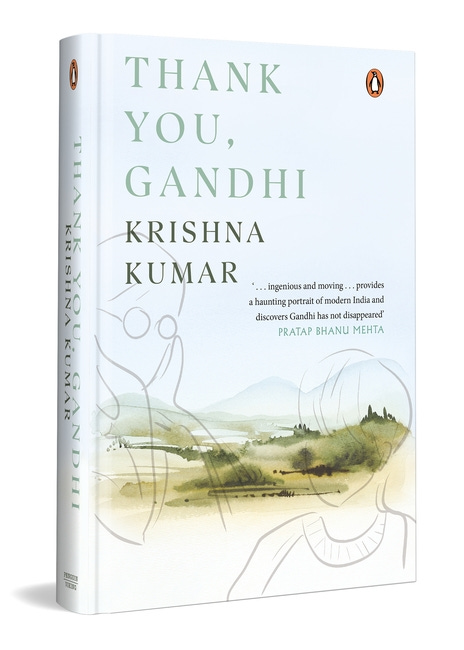Will Reverence for Mahatma Gandhi be Erased in India
In his book Thank You Gandhi Krishna Kumar says the seeds planted by the Mahatma have deep roots among Indians
By Atmanirbharananda Bharati*
“India is no longer the India we had inherited from (Mahatma) Gandhi” writes the narrator K in Thank You Gandhi. “There is a regime now that has entertained every intention of co-opting Gandhi and burying him for good… the majority of India’s voting citizenry do not mind being told that Gandhi’s assassin was a patriot.”
Mahatma Gandhi successfully led India’s non-violent struggle for independence from British rule. Soon after India gained independence on August 15, 1947, Gandhi went on fasts to bring about an end to the violent conflicts between Hindus and Muslims in Bengal and Delhi. On January 30, 1948, days after he brought peace to Delhi, while on his way to a prayer meeting in the city, he was shot dead by a Hindu fanatic.
In Thank You Gandhi, a book of fiction and non-fiction written by Krishna Kumar, the narrator K takes on the task of finishing a manuscript by Munna, a friend from childhood. The friend, who was a senior Indian civil servant, passed away from COVID. The unfinished manuscript, writes K, “was about a supremely unpleasant subject: the loss of Gandhi’s many gifts to us as a nation…now found altered beyond recognition or hope of recovery” due to the rise of Hindu nationalism in India.
Many “retired civil servants like me feel uncomfortable in India’s changed climate,” wrote Munna. “Some feel mortified…they choose to stay silent… intellectuals and academics (are branded) as enemies of the nation. Journalists and editors experience this kind of silent communication, advising them to keep their mouths shut.”
“As a young boy, I was attracted to law,” wrote Munna. But K’s father, who was an eminent lawyer, convinced him not to become a lawyer. “You may work hard as a lawyer, he said, but you can’t win a case if the judge has received a bribe. I was quite shocked when I first heard this…Soon after joining the civil services, I learnt how truth hiding became, at times, as important as truth-seeking.”
In fact, truth has “proved to be the trickiest of all values Gandhi espoused for his enemies to dent or erase…Day in and day out, I endure the untruth. It serves as a cover for hate-the real agenda of the new regime.”
(Image: Mahatma Gandhi. Courtesy Wikimedia Commons.)
Krishna Kumar writes in English and Hindi. His previous books in English include Prejudice and Pride and Battle for Peace; his books in Hindi include, Kaathgodam and Choori Bazaar Mein Larki; and his children’s books include Princess Promila and Puriyon ki Gathari. He also writes essays and short stories.
Kumar, 74 years old, is an Honorary Professor of Education at Panjab University, Chandigarh. Earlier, he was Director of the National Council of Educational Research and Training (NCERT), an apex organization for curricular reforms in India, from 2004 to 2010. He taught at the Central Institute of Education, University of Delhi, from 1981 to 2016; and was Dean and Head of the institution.
His academic work includes studying the role of language in childhood, trying to shape the school curriculum as a means of social inquiry to promote gender equality. As a Gandhian, who values peace, Kumar also seeks to tackle aggression and violence.
Kumar earned a PhD in education from the University of Toronto, Canada, in 1980. Earlier, he earned a degree from the the University of Saugar and finished high school in Tikamgarh, both in Madhya Pradesh state.
The Hindu nationalists cannot understand why they are unable to wipe away the reverence for Gandhi and his vision of peace and communal harmony, from the hearts of most Indians. The seeds Gandhi sowed are far too many to dig out and destroy, wrote Munna.
While Munna and K are both Hindus, they oppose Hindu nationalism. Instead, they are devoted to the Gandhian vision of Hind Swaraj, Indian home rule. In his book Hind Swaraj, published in 1909, Gandhi describes his vision of freedom and happiness for India. Through an evaluation of Gandhi’s book, Thank You Gandhi covers Gandhi’s political ideas: politics of suffering that arouses guilt in the oppressor’s heart; politics as a work of social repair in relation to Hindu-Muslim rancor and the caste-based practice of untouchability; criticism of the British parliamentary system; and the unique model of self-governing village communities as seen from the example of the Adivasis, a tribe in India.
Munna and K also discuss Gandhi’s vision of truth, conscience and non-violence; loving an enemy despite moral defiance against him; warning against conforming to the mighty who are proud of their bombs, the glitterati who steal, and against copying the West; critique of colonial education; critique of modern life; refusal to take modern medicine and using nature as his guide and main resource for health; and not letting hope slip away even in the darkest patches of his long career.
In this manner, Kumar offers powerful reasons why Mahatma Gandhi continues to be relevant in India.
Since there are hundreds of books on Gandhi, it is fair to ask: do we need yet another one? This book by Kumar is worth reading, especially by someone young who knows little about Gandhi.




https://3rdworldecon.substack.com/p/a-critique-of-dr-bandy-lees-essay